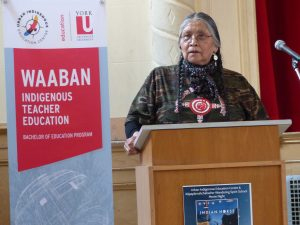
A new degree program rooted in Indigenous thought that is a partnership between York University’s Faculty of Education and the Toronto District School Board (TDSB) officially launched on May 2 with an event celebrating the Indigenous education program.
Waaban Indigenous Teacher Education – a bachelor of education degree program – marked its launch at the TDSB Urban Indigenous Education Centre, with more than 60 guests in attendance. The event included drumming, traditional Indigenous cuisine and a keynote by Anishinaabe elder Mona Stonefish.
York University Vice-President Academic and Provost Lisa Phillips brought greetings on behalf of the University and reiterated York’s commitment to fostering strong connections and engagement with Indigenous communities at York and beyond.

Elder Mona Stonefish
Keynote speaker Elder Mona Stonefish spoke about her life and experiences in a residential school, and shared how she used the many lessons and teachings from her grandmother to survive. She also challenged the program's first cohort of students to do their part to educate future generations about Indigenous culture.
“Use the teachings and knowledge that will be imparted on you by Indigenous elders and the community to change the narrative of Indigenous people in classrooms across Ontario,” she said.
During his remarks, Faculty of Education Dean Lyndon Martin acknowledged the partnership with the TDSB and the urban Indigenous community. He congratulated Professor Susan Dion and all those who were instrumental in the development of the program.
“It is wonderful to be here at the TDSB Urban Indigenous Education Centre to formally launch this program and to celebrate the work we have all done together so far," said Martin. "Waaban Indigenous Teacher Education is a part of a meaningful response by York and the Faculty of Education to the Truth & Reconciliation Committee Calls to Action, and the program is something the Faculty is deeply proud of, believes in and is committed to.”
The Waaban Indigenous Teacher Education program will educate a new generation of teachers prepared to address the needs of First Nation, Métis and Inuit students, families and communities. Grounded in Indigenous knowledge and pedagogy, the program will include teachings from Indigenous elders, educators and community leaders. Students will work with faculty members, guest speakers and others from the community to gain knowledge, insight, and skills for teaching and learning in Ontario schools.
"Waaban" is an Anishinabe (Ojibwa) word meaning "it is tomorrow." It signifies a commitment to a holistic program of teaching and learning that acknowledges the impacts of colonialism and draws on the wisdom of ancestral teachings and contemporary leaders to put Indigenous futures into Indigenous hands. The curriculum taught will include attention to contemporary urban, rural, and reserve perspectives and teachings from a diversity of nations. Students will be introduced to cultural and community resources and have opportunities to learn from and with Indigenous educators.
“The launch brought together a community of educators letting the Waaban teacher candidates know and feel supported by people committed to and anticipating their success and future contributions to Indigenous education,” said Dion.
